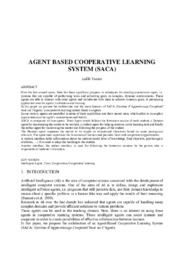Agent based cooperative learning System (saca)
Abstract
Over the last several years, there has been significant progress in techniques for creating autonomous agent, i.e.
systems that are capable of performing tasks and achieving goals in complex, dynamic environments. These
agents are able to interact with other agents and collaborate with them to achieve common goals. A promissing
application area for agents is education and training.
In this paper we present the architecture and the main features of SACA (Système d Apprentissage Coopératif
basé sur l Agent): a cooperative learning system based on agents.
In our system, agents are modelled in terms of their capabilities and their mental state, which refers to an explicit
representation of an agent s commitments and beliefs.
SACA is composed of four agents: Tutor Agent which follows the formation session of each student, a Domain
agent for representing the matter to be teached, a student agent for helping students in the learning task and finally
the author agent for monitoring the matter and following the progress of the student.
The Domain agent organises the matter to be taught on educational objectives based on some prerequisite
relations. The agent tutor supervises the formation of learners and provides them with cooperation opportunities.
A student interface holds informations about the student (initial level of knowledge, final objective, psychological
attributes, ). It is used to adapt the teaching to the student.
Another interface, the author interface, is used for following the formation sessions by the person who is
responsible of students s formation.
